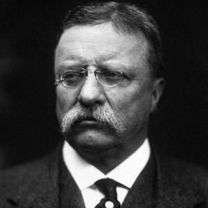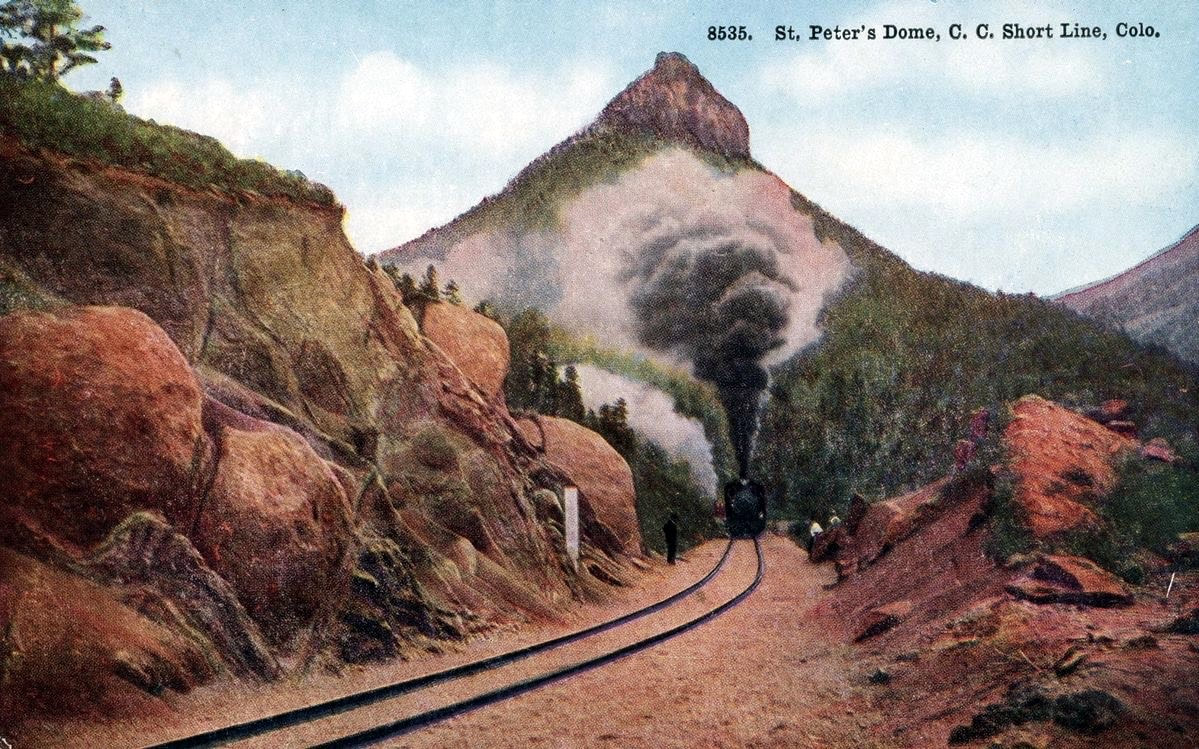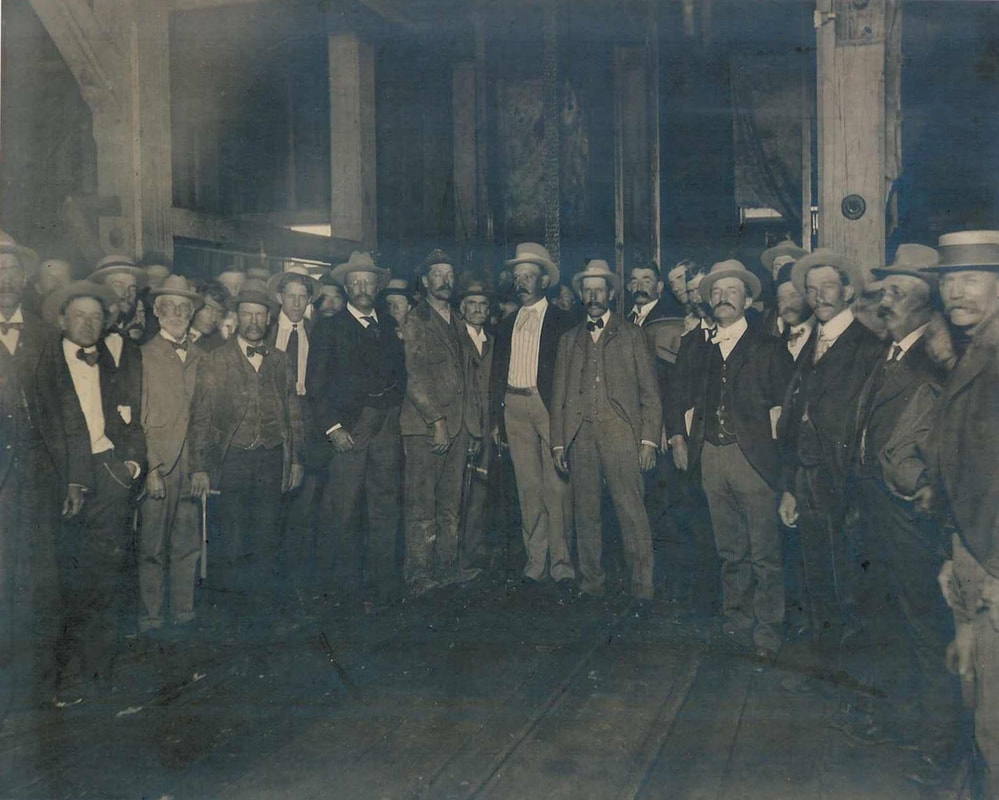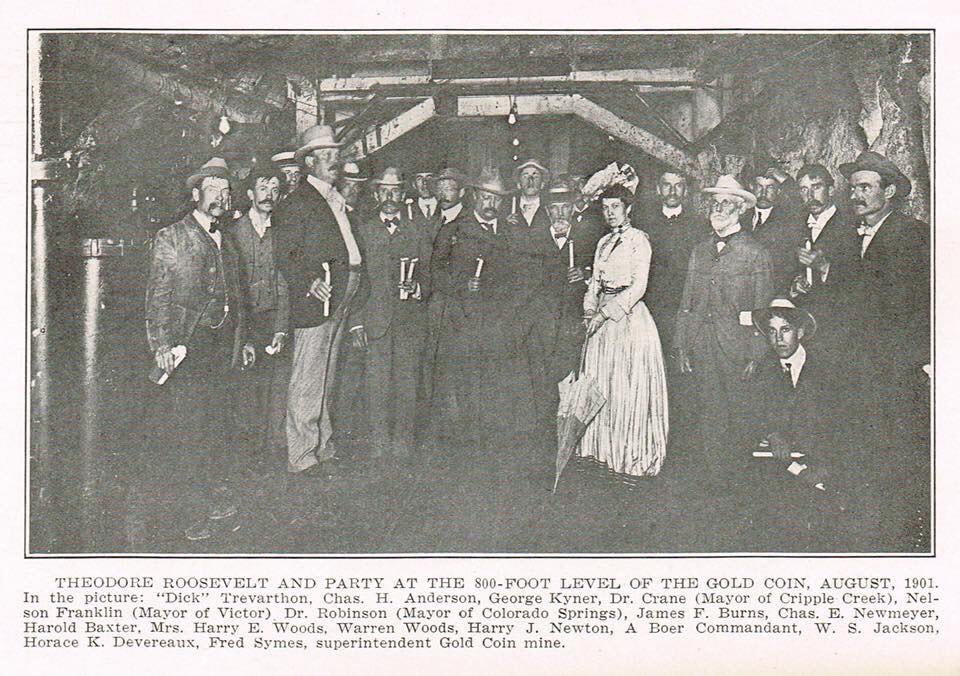THEODORE ROOSEVELT'S
CHAOITC & TRIUMPHANT VISITS TO VICTOR
CHAOITC & TRIUMPHANT VISITS TO VICTOR
 Theodore Roosevelt
Theodore Roosevelt
Threats of violence and rejection by disgruntled miners in Victor marred Theodore Roosevelt's September 26, 1900 visit. In stark contrast, an elaborately planned demonstration of respect and acceptance was organized by prominent mine owners and community leaders to cordially celebrate TR's August 9, 1901 visit.
- In September of 1900 the Republican nominee for Vice President, Theodore Roosevelt, encountered hecklers and an angry mob of miners that forced his hasty departure from Victor while campaigning to reelect William McKinley, the Republican nominee for president. Many of the disgruntled miners had come to Victor to find work after losing their jobs in Colorado silver mines which had shut down when the Gold Standard was adopted. They preferred the Democratic presidential candidate, William Jennings Bryan, who advocated for the currency to be backed by gold and silver. McKinley was an advocate of the Gold Standard. The McKinley-Roosevelt ticket was overwhelmingly victorious, winning 282 electoral votes compared to 155 for the Bryan-Stevenson ticket.
- In August 1901, the newly elected Vice-President was warmly welcomed on his second Victor visit. He was entertained with guided tours of the most productive gold mines and lavish gifts of ore produced from their wealth, a banquet and public reception at the Gold Coin Club, and an extensive carriage tour of the City of Mines. More of the same occurred in the City of Cripple Creek and throughout the Mining District.
Shown below are historic photos and excerpts from newspaper reports that describe Vice-President Theodore Roosevelt's triumphant second visit to Victor and the surrounding Gold Camp on August 9, 1901.
Roosevelt traveled to the Mining District via the Colorado Springs & Cripple Creek Railroad. Also called the Short Line, this was the third and most luxurious rail line to reach Victor in March of 1901. Spectacular views along the route, now known as Gold Camp Road, led Roosevelt to exclaim "This is the ride that bankrupts the English language."
As the train approached Victor, it stopped at the Portland Mine (No. 2). James Burns, one of the mine owners, gave Roosevelt and other prominent guests a tour of the mine. Roosevelt was gifted two sacks of gold ore before he reboarded the train and proceeded on to Victor. [Levine, p. 16]
The photo below appeared in the Denver Times Newspaper published on August 10, 1901. The caption accompanying the photo indicates it shows Roosevelt and numerous men dressed in suits standing in the Shaft House of the Portland Mine (No. 2), just before their descent into the mine.
Vice President Theodore Roosevelt is fourth from left among the men positioned in front. Others identified include Warren Woods (Gold Coin Mine Owner, 2nd from left, gray suit), and Edwin Freeman (reporter for the Denver Times, slightly behind and to the left of Theodore Roosevelt). Enhanced Newspaper Photo shared by Lori Newland Lorenz (who believes one of her relatives was part of the welcoming group).
When the train arrived in Victor, Roosevelt and other prominent guests were treated to a luncheon at the Gold Coin Club. At a reception that followed, thousands of people queued up to shake hands with the Vice President.
The text of Theodore Roosevelt's brief, unplanned speech at the Gold Coin Club Luncheon in Victor was Reported in the Denver Times Newspaper (August 10, 1901) as follows.
“Fellow Citizens, Men and Women of This Giant City: We are all good Westerners and good Americans, for all good Westerners are good Americans. I cannot thank you too heartily for this reception. You have a great state of mines—so great that we forget our great agricultural resources. What we need in the Western states is irrigation. Irrigation must and shall be. I was told that I would not be called on for a speech, so I will not continue. If you have enjoyed my visit a one-tenth part as much as I have enjoyed coming to your camp, I am delighted. It is a privilege to come to your district, but it is even a greater privilege to see your women and men. I thank you.”
Next the Roosevelt party boarded carriages to tour the City of Victor and then returned to the Shaft House of the Gold Coin Mine. It was reported that Mr. & Mrs. Harry Woods guided Roosevelt and 75 people down the mine shaft to the 800 level. There Roosevelt was offered an opportunity of dig $500 worth of ore that was sacked and gifted to him. [Levine, p. 17] In the photo below, Roosevelt is the second man to the left of Mrs. Harry Woods. Other notables in the group are mentioned in the caption.
When the party returned to the first level of the Gold Coin Mine they rode 15 electric locomotive powered mine cars through a tunnel under Squaw Mountain to the Woods' Economic Mill in Eclipse Gulch where the Vice President was shown gold concentrate extracted from the Gold Coin Mine worth over $20,000. [Levine, p. 17]
Eventually Roosevelt reboarded the Short Line Train which took him on to Cripple Creek where even more celebrations ensued. Finally the Vice President climed aboard the last Short Line train of the day back to Colorado Springs, waving to his admirers until all were out of sight.
Later that day, Roosevelt attended a ceremony to lay the corner stone of the Y.M.C.A. building under construction in Colorado Springs. The Denver Times, (August 10, 1901) reported that Roosevelt was hoarse and recovering from a heavy cold after going on a coyote chase earlier in the week, that was also aggravated by the high altitude in the Mining District. Consequently, the Vice-President only spoke for about 10 minutes and no text for those remarks was provided.
The Denver Times Newspaper on August 10, 1901 also included the following Editorial About Victor’s Welcome to Mr. Roosevelt
"The people of Victor are to be most heartily congratulated on their enthusiastic reception of Vice President Roosevelt yesterday. They have shown, by the demonstration, either that Colorado has been redeemed from the rule-or-ruin reckless variety of politicians, or, what is more likely, that the insults and assaults to which Mr. Roosevelt was subjected on his visit to the gold camp last year were the work of an irresponsible few hot-headed men, who, though Americans in name, were utterly un-American in principle and behavior."
"Such enthusiasm as was displayed at both Victor and Cripple Creek must have made Mr. Roosevelt’s heart beat high with pleasure. It was also not less gratifying to Hon. A. M. Stevenson and others who were with him on his previous memorable visit. To all of the people of Colorado, except perhaps a minute handful of men, who dishonored the state before and may not yet have repented, it is exceedingly pleasant to read that "cheer after cheer from thousands of lusty throats" greeted the distinguished American and that "ten thousand cheering men and women of Cripple Creek followed him as he went along the streets."
"Mr. Roosevelt’s visit to Colorado from the first moment that he emerged from the car at Colorado Springs, through his grandly patriotic, sturdily American and appreciatively Western address, to the hour of his approaching departure, has been a triumph for an Easterner who has grown so large that his mental stature covers all America. To Colorado, Mr. Roosevelt will ever be a favorite son, albeit by adoption. And from one end of the state to the other will go up glorious acclaims if he shall yet attain the highest of all earthly honors—the presidency of the United States."
Just 35 days after this editorial was published, William McKinley was assassinated. Theodore Roosevelt, not quite 43, became the 26th and youngest President in the nation's history from 1901 to 1909.
[White House Historical Association]
"Such enthusiasm as was displayed at both Victor and Cripple Creek must have made Mr. Roosevelt’s heart beat high with pleasure. It was also not less gratifying to Hon. A. M. Stevenson and others who were with him on his previous memorable visit. To all of the people of Colorado, except perhaps a minute handful of men, who dishonored the state before and may not yet have repented, it is exceedingly pleasant to read that "cheer after cheer from thousands of lusty throats" greeted the distinguished American and that "ten thousand cheering men and women of Cripple Creek followed him as he went along the streets."
"Mr. Roosevelt’s visit to Colorado from the first moment that he emerged from the car at Colorado Springs, through his grandly patriotic, sturdily American and appreciatively Western address, to the hour of his approaching departure, has been a triumph for an Easterner who has grown so large that his mental stature covers all America. To Colorado, Mr. Roosevelt will ever be a favorite son, albeit by adoption. And from one end of the state to the other will go up glorious acclaims if he shall yet attain the highest of all earthly honors—the presidency of the United States."
Just 35 days after this editorial was published, William McKinley was assassinated. Theodore Roosevelt, not quite 43, became the 26th and youngest President in the nation's history from 1901 to 1909.
[White House Historical Association]
Sources:
Denver Times Newspaper, Denver, Colorado, August 10, 1901.
Levine, Brian H. Lowell Thomas' Victor, Colorado Springs: Century One Press; 1982.
White House Historical Association, Theodore Roosevelt, The 26th President of the United States.
Additional Biographical Information Submitted by Nancy Luria, great granddaughter of Edwin Ruthven Freeman, shown in the enhanced photograph of Theodore Roosevelt Standing in the Shaft House of the Portland Mine (No. 2), originally published in the Denver Times Newspaper [August 10, 1902].
"Edwin Ruthven Freeman (1879-1939) was the son of James Mortimer Freeman, one of the Union Colony pioneers in Greeley, CO. James was the second mayor of Greeley (1880) and a state senator from 1880-1888. Edwin, in August 1898, after graduating from high school, became a correspondent for the Denver Times. He may have been among those accompanying the Vice President on the tour of the Victor mines in 1901 because of this role; however, it is possible he was included because of his father’s active role in the Republican party. Edwin went on to become the first concessionaire of the redwood camp at Richardson Grove (1922-32). He was the official photographer for the striking of the golden spike for the completion of the Northwest Pacific Railroad in 1914. He also created, with his first wife, Emma Belle Richart, the Freeman Art Co. in Eureka, CA. His greatest passion was promoting the conservation of the redwoods through illustrated lectures he traveled to several states to present to civic clubs and schools using his own photography."
Story updated January 2024.
Denver Times Newspaper, Denver, Colorado, August 10, 1901.
Levine, Brian H. Lowell Thomas' Victor, Colorado Springs: Century One Press; 1982.
White House Historical Association, Theodore Roosevelt, The 26th President of the United States.
Additional Biographical Information Submitted by Nancy Luria, great granddaughter of Edwin Ruthven Freeman, shown in the enhanced photograph of Theodore Roosevelt Standing in the Shaft House of the Portland Mine (No. 2), originally published in the Denver Times Newspaper [August 10, 1902].
"Edwin Ruthven Freeman (1879-1939) was the son of James Mortimer Freeman, one of the Union Colony pioneers in Greeley, CO. James was the second mayor of Greeley (1880) and a state senator from 1880-1888. Edwin, in August 1898, after graduating from high school, became a correspondent for the Denver Times. He may have been among those accompanying the Vice President on the tour of the Victor mines in 1901 because of this role; however, it is possible he was included because of his father’s active role in the Republican party. Edwin went on to become the first concessionaire of the redwood camp at Richardson Grove (1922-32). He was the official photographer for the striking of the golden spike for the completion of the Northwest Pacific Railroad in 1914. He also created, with his first wife, Emma Belle Richart, the Freeman Art Co. in Eureka, CA. His greatest passion was promoting the conservation of the redwoods through illustrated lectures he traveled to several states to present to civic clubs and schools using his own photography."
Story updated January 2024.
THE PAST MATTERS. PASS IT ALONG.
The Next Generation Will Only Inherit What We Choose to Save and Make Accessible.
Please Share Your Memories, Family Connections, and Newspaper Clippings about Victor & the World's Greatest Gold Camp
By Contacting Victor Heritage Society, PO Box 235, Victor, CO 80860 or e-mail [email protected].
The Next Generation Will Only Inherit What We Choose to Save and Make Accessible.
Please Share Your Memories, Family Connections, and Newspaper Clippings about Victor & the World's Greatest Gold Camp
By Contacting Victor Heritage Society, PO Box 235, Victor, CO 80860 or e-mail [email protected].
VictorHeritageSociety.com
Copyright © 2024 Victor Heritage Society. All Rights Reserved.
Copyright © 2024 Victor Heritage Society. All Rights Reserved.



